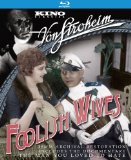| Reviews & Columns |
|
Reviews DVD TV on DVD Blu-ray 4K UHD International DVDs In Theaters Reviews by Studio Video Games Features Collector Series DVDs Easter Egg Database Interviews DVD Talk Radio Feature Articles Columns Anime Talk DVD Savant Horror DVDs The M.O.D. Squad Art House HD Talk Silent DVD
|
DVD Talk Forum |
|
|
| Resources |
|
DVD Price Search Customer Service #'s RCE Info Links |
|
Columns
|
|
|
Foolish Wives
THE MOVIE:
Please Note: The stills used here are taken from promotional materials and other sources, not the Blu-ray edition under review.
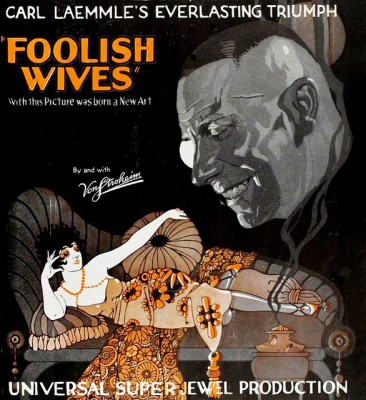
Erich von Stroheim's 1922 silent drama Foolish Wives is a masterful study of emotional manipulation. Even at its butchered length--reconstructed here to get us to 143 minutes, which is still shorter than the director's cut and the original theatrical cut--it is sharp and insightful, as well as gleefully torrid and melodramatic.
In addition to writing and directing, von Stroheim stars as the villainous Russian, Count Wladislaw Sergius Karamipzin, a veteran of the first World War now living in Monte Carlo with his two "cousins" (Maude George and Mae Busch). The wicked trio live in luxury, passing counterfeit money they get from an Italian engraver named Ventucci (Cesare Gravina). When an American diplomat (Rudolph Christians) arrives in the city, the girls decide that the Count should cozy up to his wife, Helen (Miss Dupont). Their friendship could bring the crooks legitimacy and keep the eyes of the police looking elsewhere.
The Count is a practiced lothario. He balances multiple love interests throughout Foolish Wives--though, naturally, in this kind of story, there is danger in numbers. All it will take is one of the ladies finding about any of the others. Some of his seductions are opportunistic, like the housemaid (Dale Fuller) he manipulates for cash and services; others are callow conquests, more compulsion than anything, like the counterfeiter's mentally challenged daughter (Malvinas Polo). The Count is powerless to resist his own impulses, good or bad. As he gets in deeper with Helen, there is some doubt as to how in control he really is. There are challenges to his chosen morality, both metaphorical and literal, that threaten to bring his schemes crashing down around him. It doesn't even matter whether or not his true nature will win out in the end, ruin is inevitable.
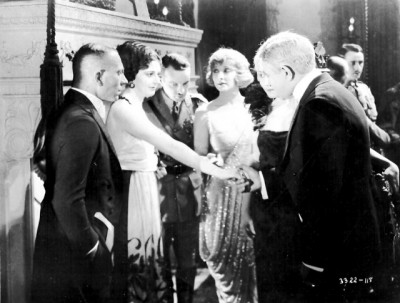
von Stroheim's egomania is legendary. He maintained a tyrannical grip on all aspects of his productions and ran both budgets and schedules far past what was agreed upon and reasonable. In Foolish Wives, the celebration of self is rather humorously spotlighted when Helen is seen reading a self-help book of the same name, written by one Erich von Stroheim. Seeing her choice of literature, the Count approves, noting that the author knows his stuff. Whether or not that's a joke, there is something to be said for von Stroheim's determined aesthetic. His tightly controlled framing reveals an uncanny sense of storytelling from a filmmaker who has considered every corner of his set. His mis-en-scene does not rely on the simple long/medium/close dynamic, but rather displays an unconventional ability to lead the eye through each location, letting objects get in the way as they naturally might, engaging the full space to add to the depth of the image. Much is rightly made of von Stroheim's grandiosity--indeed, his time spent with Griffith and DeMille clearly taught him a thing or two about arranging a large-as-life tableau--but he also shows tremendous restraint when required. Intimate scenes are either in extreme close-up, or extraneous detail is otherwise redacted. There is a creepy closeness in some of the seduction sequences, almost as if we are being forced to collude with the con man, unwitting accessories to his crimes.
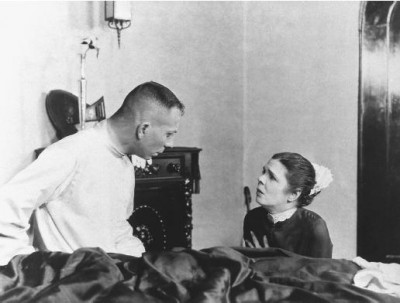
It's no surprise that von Stroheim makes a good bad guy--most of his career as a performer was spent being despicable--but credit to him for sharing the screen with some bad ladies. Both Maude George and Mae Bush are delightfully devilish as the Count's manipulative accomplices. Bush's introductory scene, where she does little more than make sarcastic faces in regards to the Count's morning rituals, shows a particular skill for pantomime. This opening is offset nicely with her final appearance, where she nonchalantly accepts that the jig is up.
Bush's shrug is a pretty good example of von Stroheim's sense of irony. Foolish Wives's has a startling, dramatic midpoint climax, but its real nadir comes after, in the resulting fallout, when the Count's deceptions are exposed and he is left grasping for cards to play. Throughout great literature and cinema, villains are made memorable not for the rotten things they do, but for the spectacular failure that follows. For as much as von Stroheim indulges in building up the Count, he deflates the huckster with a savage expediency.

THE BLU-RAY
Video:
The American Film Institute spearheaded the restoration that was used on this Blu-ray, gathering every available piece of footage to get Foolish Wives as close as possible to what Erich von Stroheim intended. Much credit and applause is due, as the 1.33:1, 1080p image transfer is exquisite. Resolution is sharp and the grain on the picture looks natural. While signs of damaged source elements do show, it's clear that every effort was made to make those clips look as clean as possible. I have pretty strong memories of the original DVD of Foolish Wives I saw a decade or more ago, and how murky and chopped up it looked; Kino's BD is light years ahead of that. There is a nice contrast in the black-and-white presentation that allows for an impressive degree of detail, ensuring that this release is probably the best the film has looked in nearly a century.
Sound:
Rodney Sauer has recorded the original score for the disc, as written for Foolish Wives' initial release by Sigmund Romberg. The stereo track sounds great, with effective volume modulation that enhances the viewing experience without overstating its case. Original title cards have also been restored for most of the movie.
Extras:
Many of the extras here are, I believe, carry-overs from previous Kino editions of Foolish Wives.
von Stroheim-biographer Richard Kozarski provides an intelligent commentary that speaks to the thematic and aesthetic aspects of the movie, while also exploring the tangled history of the production. This is also covered in shorter form in Kozarski's script for Patrick Montgomery's 1979 documentary, The Man You Loved to Hate. This feature program, newly remastered for HD, is essential viewing for film fans, detailing one of early cinema's most distinct personalities. It covers the gamut of his career, including his many acting jobs and the tumultuous shoots for his many directorial efforts, including his last and most revered, Greed. (How is there still no DVD or BD for that?)
Additional audio clips from von Stroheim's former wife Valerie and his agent Paul Kohner, are also included. These are outtakes from The Man You Loved to Hate.
A video gallery shows some of the edits demanded by the censor board from the film's original cut, complete with illustrative clips. There is also a photo gallery with production stills and ad materials.
FINAL THOUGHTS:
Highly Recommended. One of the few finished (and surviving) masterworks of a genius of silent cinema, Foolish Wives is a must-see for cinephiles who appreciate artful direction being applied to passionate melodrama. Erich von Stroheim writes, directs, and stars in an epic seduction, playing a dastardly Russian Count pursuing women, money, and legitimacy in Monte Carlo. This new high-def Blu-Ray utilizes the most complete available cut of this 1922 classic, and the package is rounded out with quality extras.
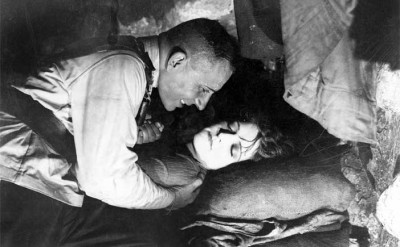
Jamie S. Rich is a novelist and comic book writer. He is best known for his collaborations with Joelle Jones, including the hardboiled crime comic book You Have Killed Me, the challenging romance 12 Reasons Why I Love Her, and the 2007 prose novel Have You Seen the Horizon Lately?, for which Jones did the cover. All three were published by Oni Press. His most recent projects include the futuristic romance A Boy and a Girl with Natalie Nourigat; Archer Coe and the Thousand Natural Shocks, a loopy crime tale drawn by Dan Christensen; and the horror miniseries Madame Frankenstein, a collaboration with Megan Levens. Follow Rich's blog at Confessions123.com.
|
| Popular Reviews |
| Sponsored Links |
|
|
| Sponsored Links |
|
|
| Release List | Reviews | Shop | Newsletter | Forum | DVD Giveaways | Blu-Ray | Advertise |
|
Copyright 2024 DVDTalk.com All Rights Reserved. Legal Info, Privacy Policy, Terms of Use,
Manage Preferences,
Your Privacy Choices | |||||||









